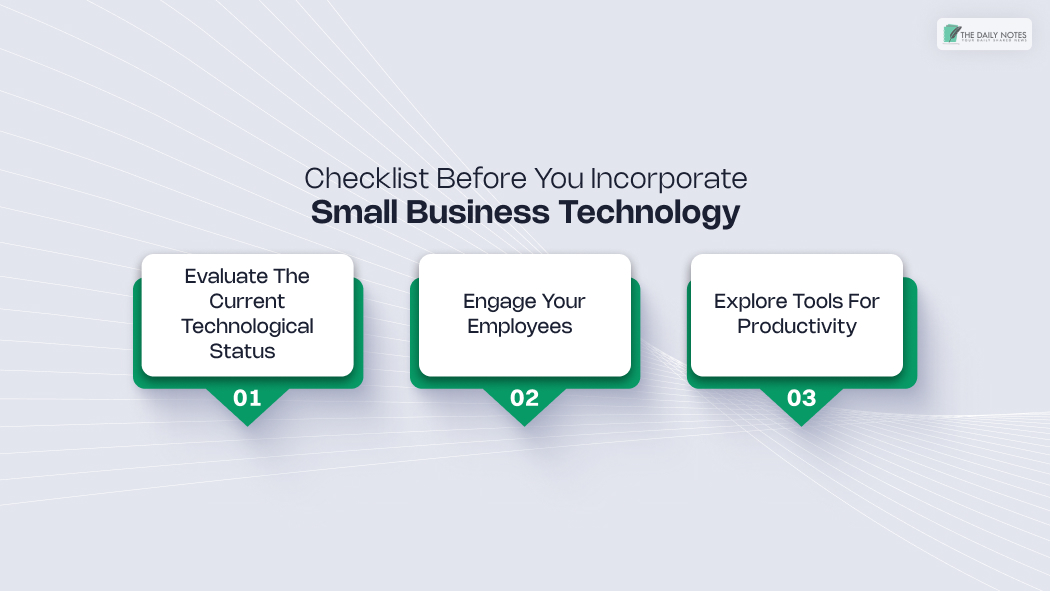As a small business owner, you may feel as if you’re not proactively using technology for your business, you’re missing out. Still, small business technology can play a crucial role in efficiency and overall business growth.
Given how much things have changed due to 2020’s COVID-19, these small business technology trends will be more critical in 2024 and the following years. It doesn’t matter if you’re a small bakery or if a new business handling lifetime coverage of health insurance is at your service.
While new infrastructure, like AI and 5G, will continue to gain traction globally, other trends – such as cybersecurity, personalized marketing, and software unification – can also directly impact small businesses.
Business Tech Trends For Small Businesses:
Here’s a list of all the small business technologies that can help you bring results. Are you incorporating them wisely? Check it out:
1. Artificial Intelligence:

Artificial intelligence (AI) and machine learning have been buzzwords in the tech industry for years. As newer technologies are introduced into more solutions, small business owners will continue incorporating them into current and new processes.
This could mean a variety of implementation scenarios, from personalized customer experiences and voice assistants. Although artificial intelligence may seem like a tool only large enterprises use, many small businesses are adopting it.
After all, AI is designed to help businesses of all sizes offer a more personalized customer experience by automating manual tasks and maximizing their time. If your team spends almost a quarter of the day on manual tasks, AI and automation prove huge assets.
2. Comprehensive HR Tech:
One area that increased in relevance in 2020 due to the COVID-19 pandemic was human resources. HR software and tech can help small businesses keep track of their employees in terms of their performance and needs.
Most of the focus on HR tech comes from the shift to remote work, though HR software has already been assisting businesses pre-pandemic.
The shift to remote work has changed companies regarding engagement, communication, employee development, and productivity. It has also highlighted the need for better HR technology to address these challenges.
A centralized HR information system can help businesses manage people and meet employee/employer expectations.
3. Cybersecurity Focus:

Research reveals that nearly 60 percent of small businesses are confident they will not be targeted in a cyberattack. However, many small businesses have been victims of cyberattacks in 2020. This year should be the year that small business owners should start fighting back.
Newer standardized tackling and blocking game plans keep today’s businesses safer than before. Also, small- and medium-sized companies now lock down on comprehensive disaster-recovery-and-backup solutions to protect their information.
4. Tech-Assisted Shopping:
In response to the quarantine and other COVID-19-related disruptions, many businesses have turned to online shopping, mobile scheduling, and mobile tech to create a contact-free shopping experience.
Mobile payments are no longer a convenience to escape long checkout lines; they are now a requirement for most retailers. Mobile terminals and checking out with QR codes are also the norm for most businesses.
Since vaccinations have not yet reached a critical mass in the US, these tech-assisted shopping methods may remain in 2024 and beyond.
5. Influencer Marketing:
Personalized marketing and social media influencers are viable avenues for showcasing products while establishing more robust relationships with customers (both current and new). These two tools help businesses develop a dynamic marketing strategy, which means working with influencers is still a must for this year.
Remember: consumers want more authenticity from brands. Regarding ads, they prefer recommendations from people they trust, such as influencers.
Personalized marketing via influencers can help you connect with customers and establish your niche within the industry.
Partnering with influencers requires a thorough understanding of your business’s needs and determining the influential people within the industry.
Checklist Before You Incorporate Small Business Technology

Incorporating technological changes in your business may seem like a huge change. Here’s a checklist for you to make sure you are correctly investing in small business technology:
Evaluate the current technological status
An objective look at your current technological state will help you know the exact changes needed. From identifying the areas of improvement to conducting a thorough competitor analysis, your work gets easier.
This check-up will help you know when to make the changes and whether the existing technology meets the strategic goals.
Engage Your Employees
Involving your employees in such operational decisions will help you enhance adaptability. Before you make significant investments in technology, ensure your plans involve proper discussions.
A discussion with employees will help you know their opinion on small business technology and provide ideas that can add to the plans.
Explore Tools for Productivity
With technological advancements, there is a lot of innovation in the tools people use. With this checkpoint, you need to explore where such innovation can fit in with your business. Productivity tools are one area that can easily find their way as technological adaptation in any sector.
Small businesses greatly benefit from such innovative productivity tools as they help guide day-to-day operations.
How to Incorporate Tech in Your Small Business?
The key to being a successful small business owner is constantly finding ways to upgrade your technology. When you incorporate technology into strategies, you get more work done and a leg up on the competition.
Here are some tools that can help improve your small business:
- Web development
- Cloud data management
- Artificial intelligence
- Social media dashboards
- Mobile app development
There are many possibilities in terms of technological solutions on the market. It’s essential to pay attention to these trends in their current state and as they evolve. Future-proof your business by integrating tech into your operations.
And It’s A Wrap
That was all on small business technology and how you as a small business owner can make a difference. The technological trends are here to revolutionize how corporate functions. This is one of the primary reasons for a rise in workshops to upskill professionals.
You would have noticed how some large corporations are already adapting to this technological shift. From hiring professionals with such skills to training their employees, efforts to implement changes are in full swing.
Is your business ready to adapt to the change? Tell us what measures are you taking.
Read Also:




























